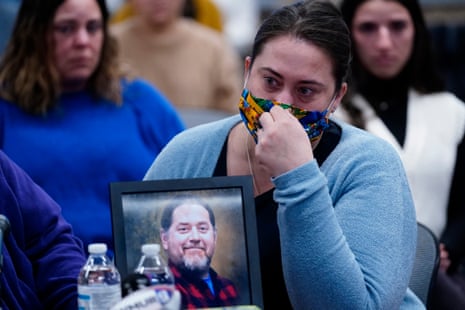
Police had cause to detain gunman before deadly Maine shooting last year – report
Before Robert Card killed 18 last year, police had opportunity to seize his guns and place him in custody after several incidents
Law enforcement should have seized a man’s guns and put him in protective custody weeks before he committed Maine’s deadliest mass shooting, a report found Friday.
An independent commission has been reviewing the events that led up to army reservist Robert Card killing 18 people at a bowling alley and a bar in Lewiston on 25 October, as well as the subsequent response.
The commission criticized Sgt Aaron Skolfield, who responded to a report five weeks before the shooting that Card was suffering from some sort of mental health crisis after he’d previously assaulted a friend and threatened to shoot up the armory in Saco.
The commission found that Skolfield, of the Sagadahoc county sheriff’s office, should have realized he had probable cause to start a so-called “yellow flag” process, which allows a judge to temporarily remove somebody’s guns during a psychiatric health crisis.
Leroy Walker, whose son Joseph was killed in the shootings, said the commission’s finding that the yellow flag law could have been implemented but wasn’t reflected what victims’ families have known all along.
“The commission said it straight out – that they could have done it, should have done it,” said Walker, an Auburn, Maine, city council member. “What something like this really does is it brings up everything … It just breaks the heart all over again.”
Maine state police and the sheriff’s office did not immediately respond to calls seeking comment.
Commission chairperson Daniel Wathen said the panel’s work wasn’t finished and that the interim report was intended to provide policymakers and law enforcement with key information.
“Nothing we do can ever change what happened on that terrible day, but knowing the facts can help provide the answers that the victims, their families, and the people of Maine need and deserve,” Wathen said in a statement.
Ben Gideon, an attorney representing the victims, said he felt the report focused heavily on the actions of the sheriff’s office while ignoring the broader issue of access to guns by potentially dangerous people in the state. He also said he hoped the report would make the shooter’s health records available to victims and the public, which it did not.
Elizabeth Seal, whose husband, Joshua, was killed in the shootings, said she felt the focus of the report was “narrow” and expressed disappointment “that the committee didn’t take a wider view of the issues that start as far back as May”. That’s when Card’s family warned police he had grown paranoid, and reported being worried over his access to guns.
Led by a former chief justice of Maine’s highest court, the commission also included a former US attorney and the former chief forensic psychologist for the state. It was assembled by the state’s Democratic governor, Janet Mills, and the state’s attorney general, Aaron Frey.
It held seven sessions starting in November, hearing from law enforcement, survivors, victims’ family members and members of the US army reserve as it explored whether anything could have been done to prevent the tragedy and what changes should be made going forward.
The commission plans to schedule more meetings. Spokesperson Kevin Kelley said a final report was due in the summer.
Card, who was found dead by suicide after a two-day search, was well known to law enforcement, and his family and fellow service members had raised flags about his behavior, deteriorating mental health and potential for violence before the shootings.
One warning sign came in September, when a fellow reservist texted an army supervisor about his growing concerns about Card, saying: “I believe he’s going to snap and do a mass shooting.”
Law enforcement officials told commission members that Maine’s yellow flag law makes it difficult to remove guns from potentially dangerous people.
Source: theguardian.com



